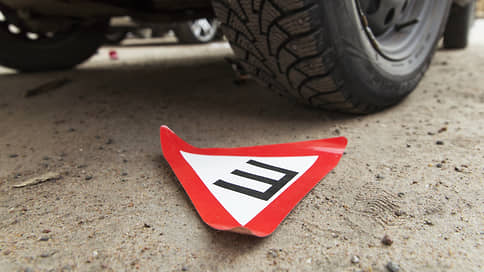The government has identified faults for which you can fine on the road
[ad_1]

From September 1, for the first time, Russians will be fined for using studded tires in summer and for driving in winter on summer tires, inoperative anti-lock brakes and non-standard gas discharge (xenon) or LED lamps in headlights. The government approved a new “list of malfunctions in which the operation of vehicles is prohibited.” The traffic police also uses this document to issue fines for identified shortcomings in the technical condition of cars.
Art. 12.5 of the Code of Administrative Offenses: these documents allow the traffic police to fine (in the amount of 500 rubles or more) drivers for driving a vehicle with various technical shortcomings and breakdowns – from burnt out light bulbs to idle wipers. Since 2020, the Ministry of Internal Affairs has been preparing an updated list, which has been discussed many times, corresponded (which Kommersant talked about) and is now approved – the innovations come into force on September 1.
From June to August, a ban on the use of studded tires is introduced (a sanction of 500 rubles). Winter tires without studs (so-called Velcro) will not be penalized. Summer tires will be banned from December to February for drivers of cars (M1) and light trucks (N1). At first, the Ministry of Internal Affairs wanted to allow the regions to change the time period for bans (for example, Yakutia could extend the ban on summer tires until March), but after discussions, this idea was abandoned. Drivers of other trucks (N2, N3) and buses (M2, M3) without winter tires (studded or non-studded) will be required to carry snow chains. The requirements for the residual depth of the wear tread remain the same (for passenger cars, in particular, at least 1.6 mm), and measurements must be made using “technical diagnostic tools”, that is, calipers. The Ministry of Internal Affairs already buys them for the regions. If the tire has a wear indicator (as most modern models have), the inspectors will be guided by it.
The current list contains a general wording regarding lighting devices: it is forbidden to use a vehicle in which they “do not work in the prescribed mode or are dirty.” The new document introduces specifics: you can not use light sources in headlights and lanterns, the class of which does not correspond to the “provided for in the operational documentation”, the fine for violation is 500 rubles. This wording will simplify the control and application of sanctions against car owners whose headlights have non-standard gas-discharge (xenon) and LED lamps. They shine brighter than usual, but their handicraft installation in optics not intended for this leads to blinding of the oncoming stream. A non-working regular automatic headlight corrector (it is usually installed on factory xenon headlights) will also be considered a violation.
A ban on driving with an inoperative anti-lock braking system ABS is introduced – the inspector will determine the malfunction by the indicator on the dashboard. According to Kommersant, in a number of regions, brake malfunctions (for example, an idle handbrake) are already qualified under Part 2 of Art. 12.5 of the Code of Administrative Offenses: not only a 500-ruble fine is applied, but also evacuation to the impound. This practice is highly likely to continue after September 1st.
The rules for ensuring visibility from the driver’s seat have been adjusted. Today it is forbidden to install “additional items” that limit this visibility (including large tablets and video recorders). It has been clarified that rear-view mirrors, windshield wiper parts, radio antennas built into glass and electrical heating filaments do not belong to such items.
“Over the past decades, the design of cars and trailers for them has changed significantly, new components and systems have become widely used on vehicles – ABS, tires with wear indicators, inertial seat belts, automatic control of automotive systems, etc.,” the Ministry of Internal Affairs said. Russia.— During the development of the draft resolution, suggestions and comments from business representatives and experts in the field of motor transport were taken into account. It includes only those provisions, non-observance of which directly affects safety. To ensure the unambiguity of the interpretation of the currently applicable standards, the requirements for braking systems, steering, external lighting devices and the engine are detailed.
According to the traffic police, in 2022, technical malfunctions and conditions under which the operation of a car is prohibited were identified during the investigation of 4.6% of all accidents (5.8 thousand). The most common are changes in the design of the car that were not coordinated with the traffic police, installation of tires of different sizes and with different types of tread on the same axle, malfunction of external lighting devices, excessive tinting.
“Following the results of a three-year discussion, a balanced document was obtained, from which all ambiguous norms were excluded,” says Yevgeny Litvin, co-chairman of the “Road Safety” working group within the framework of the “regulatory guillotine.” For example, a ban on the operation of a car with a burning Check Engine symbol was discussed ( lights up in case of various engine malfunctions, for example, due to the use of bad fuel.— “b”) — it was eventually abandoned because it could lead to abuse.” Mr. Lytvyn calls the released document “a good example of interaction between the Ministry of Internal Affairs and society and independent experts.” “Of course, there are opinions that the list should have been further developed. Bans related to summer and winter tires raise many questions among experts,” he adds. “After September 1, it will be possible to track law enforcement practice and, if necessary, make clarifying amendments to the decree.” The list “finally introduces clearer requirements harmonized with the requirements of technical regulations and current standards,” agrees Grigory Shukhman, expert of the working group.
[ad_2]
Source link








